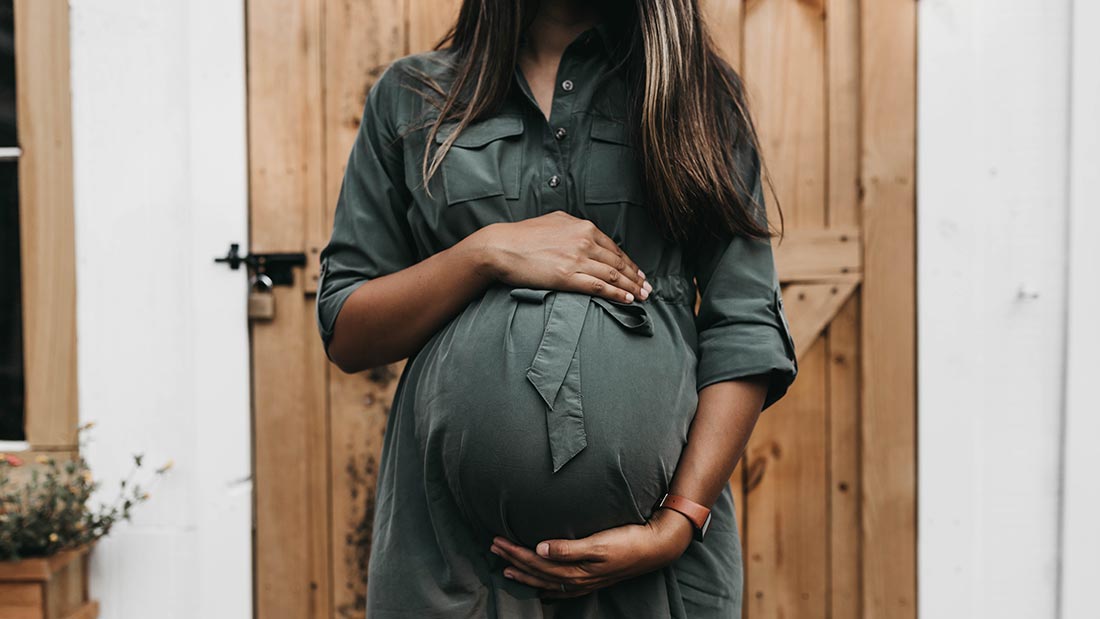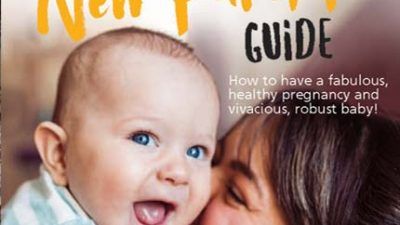Veganism and pregnancy – what you need to know!

Being vegan invites comments and unsolicited opinions at all times but when you’re pregnant and vegan, it goes into overdrive and you may even begin to doubt yourself. Don’t let it get to you! Here’s what you need to know as a vegan mum-to-be to ensure a healthy pregnancy.
Diet is very important when you’re nurturing a growing baby but your body still has the same nutrient requirements as before – you’ll just need to eat a little more as the baby gets bigger you both get all the essential nutrients.
If you have a generally healthy diet, this won’t be much of a challenge but if you live off vegan junk food, it’s probably time to mix it up a little and introduce some fresh, healthier foods.
Pregnancy diet low-down
By being vegan, you’re already doing well because you’re not consuming harmful substances such as heavy metal residues from fish, dangerous bacteria in cheese, pesticides and cancer-causing chemicals in meat. A great start!
Next step is to make sure you’re eating the basic food groups to get your full set of nutrients:
- Wholegrains (oats/wholegrain breakfast cereal, wholemeal bread and pasta, brown rice, buckwheat, quinoa, barely)
- Pulses (beans, lentils, peas, chickpeas, soya – and products made from them)
- Nuts and seeds (almonds, cashews, pumpkin seeds and Brazil nuts. For omega-3 fats – flaxseed, hempseed, chia seeds, walnuts)
- Fruit and vegetables (fresh fruit or blended in a homemade smoothie, unsweetened dried fruit, steamed, lightly boiled or baked veggies and dark green leafy vegetables – daily)
- Extra vitamins (B12 fortified foods or a supplement, vitamin D supplement)
Your daily menu may look a bit like this:
Breakfast: Muesli/porridge, fresh fruit and a spoonful of ground flaxseed OR wholemeal toast with nut butter and yeast extract, fresh veggies, cup of tea
Snack: Fresh fruit, a small handful of nuts (almonds, walnuts) and dried fruit, green tea
Lunch: Wholemeal bread sandwich with fresh vegetables and a protein-rich filling such as hummus, tofu or mock meat slices (and whatever else you fancy!); OR a falafel wrap OR a bean burger with a side salad. A piece of fruit or a couple of pieces of chocolate for dessert, cup of tea
Snack: Wholegrain crackers/oat biscuits with a dip, veggie sticks, pumpkin seeds, cup of green tea
Dinner: Chickpea curry with brown rice OR bean casserole with root vegetables OR pasta dish with smoked tofu and veggies
After dinner: A couple of digestive biscuits, plant yoghurt with dried fruit or chickpea-based savoury snacks (puffs, popadoms, crisps)
A note on caffeine – the above are just examples of what’s a sensible amount to consume in a day, it doesn’t mean you need to consume caffeinated drinks! On the other hand, if you drink coffee, limit it to two cups a day.
It’s also important that you eat enough but not too much – tricky, eh? So why is it important? According to scientific studies, if you don’t eat enough, your baby may be more predisposed to obesity because the lack of energy in the womb switches on certain genes that will make food-searching behaviour a priority in order to prevent future hunger. At the same time, if you eat too much – and especially foods that are high in sugar and fat – it also has a negative effect on the baby – affecting their metabolism and making them more likely to store unhealthy fats in their bodies.
Pregnant women need about 2,500 calories a day and those breastfeeding about 3,000 calories. However, these are general figures and each person has a different metabolism so it’s best to take it only as guidance and see what suits you. If you’d like to track your energy and nutrient intake, you can use Cronometer website or app.
Nutrients to watch
You will get almost all the nutrients you need from a healthy diet but there are a few that deserve special attention.
Iron
Adequate iron intake (15mg) is crucial because you’re not only using it for your own blood formation, you’re also creating new blood for your baby. From the second trimester, your iron needs increase and almost double, so you’ll need to up your intake of iron-rich foods and/or choose a supplement, such as Floradix Floravital syrup.
The best sources of iron: beans, lentils, tofu, nuts and seeds, quinoa, dried figs, apricots and prunes, green leafy vegetables and wholegrain products.
Vitamin C helps you to absorb more iron from your food so eat iron-rich foods together with those containing vitamin C, such as citrus fruit, peppers, kiwi, berries, broccoli, spinach and cabbage.
Calcium
Essential for bone and tooth development, calcium is also vital for muscle and nerve function. During pregnancy, the efficiency of your calcium absorption increases so the recommended intake is no higher than for the average adult (700mg). When you start breastfeeding, however, you’ll need almost twice as much so it’s good to get in the habit of eating calcium-rich foods daily.
The best sources of calcium: almonds, sesame seeds and tahini, dried figs, dark green leafy vegetables (kale, broccoli, watercress), butternut squash, beans, tofu, calcium fortified plant milks.
Iodine
Iodine is a trace element needed for normal foetal growth and brain development. It is present in seawater, which means seaweed is a rich source. There are varying levels of iodine in soil so crops tend to have a varied and unreliable iodine content. If it’s available to you, iodised salt is the best bet to ensure adequate intake
Zinc
Zinc plays a crucial part in reproduction, conception and the embryo development. There are many great vegan sources so if you make them a part of your daily diet, it will comfortably cover your and your baby’s needs.
The best sources of zinc: pumpkin seeds, wholegrains, tofu, beans, lentils, cashews, sesame seeds
Folate
Folate – vitamin B9 – is needed for cell division, a healthy nervous system and plays a part in blood formation. One of its key roles in a growing embryo is the development of the neural tube. Women who are deficient in folate have a higher risk of having a baby with the condition called spina bifida. That’s also the reason why women planning a pregnancy are advised to take 400 micrograms (but not more than 1,000) of folate per day and continue this for at least three months after becoming pregnant. Your body doesn’t store folate very well so it’s important to have a steady intake.
The best sources of folate: asparagus, Brussel’s sprouts, spinach, kale, cabbage, pak choi, rocket, broccoli, lettuce, red peppers, lentils, nutritional yeast and yeast extract, soya beans (edamame), tempeh, soya milk, muesli.
Vitamin B12
You probably know all about B12 as it’s a vegan hot topic. In short, we need it for a healthy nervous system and blood formation – both are super important for a growing baby. However, B12 is hard to get from foods alone so many are fortified but when you’re pregnant, it’s best to take a supplement.
The best sources of vitamin B12: fortified breakfast cereals, plant milks, yeast extracts, B12 supplement.
Vitamin D
Vitamin D is another notorious vitamin – our skin makes it when exposed to sunlight but its production is limited during autumn, winter and spring so everyone is now recommended to take a supplement containing 10 micrograms of vitamin D. There’s no exception to this rule in pregnancy!
Omega-3 fats
Unsaturated fats, and omega-3s in particular, are needed for the development of the brain and eyes. It’s important for you to eat enough of these so your baby has a steady supply.
The best sources of omega-3 fats: ground/milled flaxseed (linseed), hempseed and hemp oil, chia seeds, cold-pressed rapeseed (canola) oil, walnuts, dark green leafy vegetables.
Protein
Yes, as a vegan you get enough protein but it’s recommended to increase your intake in pregnancy. If you want to do the maths, you should aim for 1.1 gram of protein per kilogram of bodyweight. So if you weigh 68kg, you should eat around 75 grams of protein daily.
The best sources of protein: beans, lentils, chickpeas, nuts, seeds, nut butters, wholegrains
Fibre
Eating all the plant-based wholefoods listed above has another health benefit – it means a superb fibre intake. That’s important for two reasons:
- Higher fibre intake has been shown to reduce the risk of preeclampsia – a condition where the blood flow to the placenta is restricted and which substantially increases the risk of premature delivery.
- Healthy fibre intake also significantly reduces your risk of gestational diabetes – vegans have a much lower risk!
Prenatal multivitamin and mineral
You may be thinking of getting a multi supplement so you don’t have to worry about each nutrient. Is it a good idea? It may be a great solution if it serves to complement a mostly heathy diet but no supplement can make up for a poor diet – so proceed with caution.
Cravings
It’s difficult to generalise about cravings as they are so individual but if you suddenly get a taste for mock meats, vegan cheese or pickles and ice cream, go for it. Just make sure you also eat some heathy foods and perhaps try to limit the amount of sugar and fat you eat so it doesn’t reach epic proportions.
Final advice
It’s a good idea to join vegan parenting groups online, not just for information sharing but it’s great for reassurance and encouragement too!
Most likely, you’re doing great as a vegan mum-to-be so don’t worry too much. Being vegan sets you up for a healthy pregnancy in the best possible way.





